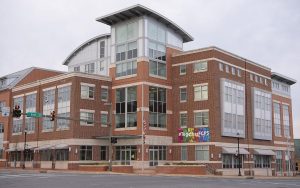The solution
FCPS issued a request for proposal, and after a highly competitive process, FCPS chose a Juniper Networks WAN and data center solution designed by Data Networks. An IT solution provider with more than 30 years of experience, Data Networks is a Juniper Networks Elite Partner and was named Ingram Micro’s 2016 Juniper Partner of the Year. FCPS was able to leverage the federal E-rate program, as a result of the openly competed Data Networks solution, to cost-effectively replace its legacy network.
Building more than a Juniper networking solution enabled FCPS to meet academic goals by enhancing network performance and reliability, while simplifying network operations. FCPS uses the Juniper Networks® QFX5100 line of switches in its two data centers and disaster recovery site.
Juniper Networks Virtual Chassis technology—available on Juniper Networks EX Series Ethernet Switches and QFX Series switches—makes the network simpler, more reliable, and more cost-effective to manage and maintain. Virtual Chassis technology reduces the number of managed devices and helps the network scale without the operational overhead associated with maintaining a system of independent switches.
The network connects 66 school sites, including 36 elementary schools, 13 middle schools, 10 high schools, three public charter schools, an alternative school, and a special education school. The Juniper Networks EX4300 line of Ethernet switches and EX4600 Ethernet Switch are used for campus and classroom connectivity at the school and hub sites.
Juniper Networks Junos® Space Network Director lets the IT staff manage the enterprise network though a single pane of glass. The network administration team uses Network Director to visualize, analyze, and control the district network. Routine management tasks like network provisioning and troubleshooting are automated, which improves operational efficiency and reliability.
Mission accomplished
Mission accomplished
There’s no more trouble meeting the demands of digital learning or the state-mandated PARCC assessments, either. FCPS has full confidence to advance its 1:1 initiative, putting mobile devices in the hands of every student. The district deployed 8,000 new mobile devices last year, and it now has more than 24,000 mobile devices for students.
“A year ago, we were struggling with the non-Juniper routers and BYOD,” says Chris Bohner, network and security manager at FCPS. “Since then, we have dramatically increased our count of Chromebooks, and there’s no noticeable impact on network performance, which shows the scalability of Juniper.”
“We have over 42,000 students who access the cloud daily,” says Strunk. Students use Google Classroom, Google Drive, and other resources from their Chromebooks. Other cloud apps include Microsoft Office 365, TLC library system, READ 180 reading program, and a dozen different assessment programs. The Juniper network stands up to the demands of cloud applications and mobile devices.
The data center also supports FCPS’s administrative applications, including human resources, student information services, food services, and transportation. The network supports IP phones, web conferencing, and a legion of IP surveillance cameras that enhance physical security at school sites. Heating and air conditioning at the schools are controlled over the network, as are the security badges that control access to buildings.
The Juniper network supports more users, more devices, and more applications than ever, enabling FCPS to deliver the academic experience students and teachers expect. Behind-the-scenes performance has also improved. Virtual workloads can be migrated within or across data centers based on demand and load, backups complete faster, and failover from one data center to another is seamless.
The Juniper network is fast and reliable. “Our core network is self-healing and redundant to ensure that learning is not disrupted by network outages,” says Bohner. “Having an ultra-reliable network allows us to focus on more strategic network projects.”
The network is also simpler to operate—a critical factor with growing network needs and a small network staff. The network is managed centrally, which is a big time saver in a 600-squaremile county where it can take more than an hour to travel to a school to deal with an outage or an upgrade. Another major improvement is mitigating the risk of downtime with the ability to roll back to previous network configurations.
“With our previous network vendor, when we had to make changes, we needed to be onsite, because if you made a mistake you could lock yourself out of the network,” Strunk says. “With Juniper, we can simply roll back a configuration. A Juniper network is much more manageable and easier to troubleshoot.”
Data Networks’ insights into the technology needs of K-12 schools, along with deep networking expertise, ensured the success of the deployment. The solution provider worked closely with the FCPS team on planning, testing, and training. “We are committed to delivering the innovative, cost-effective technologies our customers require,” says Patrick Regan, president and CEO of Data Networks.
Next steps
Frederick County students consistently outpace their state and national peers in academic achievement measures such as the SAT. The 2016 graduation rate was 92%, and 99 percent of employers surveyed indicated that FCPS students met or exceeded workplace readiness standards.
The district continues to open new schools and renovate existing sites to meet the needs of more students. For example, the newly constructed Frederick High School, a state-of-the-art, energy-efficient building with LEED silver certification, opened to students in the fall of 2017. By partnering with Juniper, FCPS built a better network so it can meet the community’s expectations for academic excellence. “We will continue to grow the network. We need to stay lean and support a large network spread across a large county, and the Juniper solutions have the capabilities to meet these requirements,” Bohner says.







